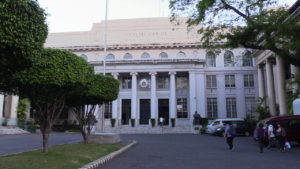MANILA, Philippines - Locking or putting individuals who are not COVID-19 patients and placing them under quarantine with unlimited period "is a complete disregard of the safeguards stated under the 1987 Constitution," a former law school dean said before the Supreme Court.
Former Laguna State Polytechnic University (LSPU) Law Dean Jaime Ibañez, in his petition, urged the Supreme Court to annul several provisions of the law and issuances that were released to fight COVID-19.
He said the Republic Act 11469 or the Bayanihan Act, under the phrase "for other purposes," granted President Rodrigo Duterte legislative authority beyond what is necessary and proper to meet the declared policy in the law.
"Legislative power to make laws is vested in Congress. The President is merely tasked to execute the law," he claimed in his petition.
"Hence, it is an undue delegation of legislative power and usurpation of the same, when the President issued Proclamation No. 929 and 922, lacking legislative authority and guidelines passed by Congress in a situation of national emergency," he said.
He added that putting everyone under quarantine is "unreasonable and arbitrary," which is not related to the purpose of the law.
Under RA 11469, to mitigate the transmission of COVID-19--those with confirmed cases, suspected and probable cases should be placed under compulsory and immediate isolation and treatment.
"To include persons or individuals not covered by the law and put them into community isolation or quarantine is not only beyond the scope of the legislative policy of RA 11469 but also over-intrudes and overburdens individuals right to liberty and to property (including the right to work) and hence violative of the equal protection clause," he said.
While the law on hits face appears to be fair, if it allows unjust and illegal discrimination, "it is within the constitutional prohibition," he said.
He pointed out that the Inter-Agency Task Force (IATF) which is tasked to formulate rules by using the COVID-19 issuances as a guide, has no power to set its own parameters and restrictions "and to even invent the Modified Enhanced Community (Quarantine) according to its own bizarre definition, which all amount to an exercise of grave abuse of discretion or in excess of its jurisdiction."
Instead of restricting the people's movements, he said the better alternative is to increase the capacity of the country's health systems and to take measures such as testing and contact tracing and of course, treating the COVID-19 patients.
Aside from the Bayanihan Act, the former Law Dean also questioned the legality of Presidential Proclamation No. 929, issued on March 16, declared a state of calamity in the entire Philippines, while Presidential Proclamation No. 922, issued on March 8, declared a state of public health emergency in the country.
He also sought to annul Executive Order No. 112 on ECQ, and the Inter-Agency Task Force (IATF) Resolution No. 37, which placed Metro Manila under the modified ECQ (MECQ).
This is the first case filed before the Supreme Court that questions the government's action against the health pandemic.
The petition was filed at the height of the clamor for Congress to extend the Bayanihan Act. Bayanihan to Heal as One Act has a sunset clause limiting its effectivity to only three months after being signed by President Duterte into law on March 25.
RELATED STORY
Palace: Three-month extension of Bayanihan law 'ideal'

